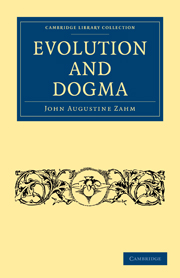Book contents
- Frontmatter
- PREFATORY NOTE
- Contents
- INTRODUCTION
- PART I EVOLUTION, PAST AND PRESENT
- PART II EVOLUTION AND DOGMA
- CHAPTER I MISCONCEPTIONS OF THEORY, ERRORS IN DOCTRINE AND MISTAKES IN TERMINOLOGY
- CHAPTER II MONISM AND EVOLUTION
- CHAPTER III AGNOSTICISM AND EVOLUTION
- CHAPTER IV THEISM AND EVOLUTION
- CHAPTER V THE ORIGIN AND NATURE OF LIFE
- CHAPTER VI THE SIMIAN ORIGIN OF MAN
- CHAPTER VII TELEOLOGY, OLD AND NEW
- CHAPTER VIII RETROSPECT, REFLECTIONS AND CONCLUSION
- AUTHORS AND WORKS CITED IN “EVOLUTION AND DOGMA.”
- GENERAL INDEX
CHAPTER V - THE ORIGIN AND NATURE OF LIFE
Published online by Cambridge University Press: 29 August 2010
- Frontmatter
- PREFATORY NOTE
- Contents
- INTRODUCTION
- PART I EVOLUTION, PAST AND PRESENT
- PART II EVOLUTION AND DOGMA
- CHAPTER I MISCONCEPTIONS OF THEORY, ERRORS IN DOCTRINE AND MISTAKES IN TERMINOLOGY
- CHAPTER II MONISM AND EVOLUTION
- CHAPTER III AGNOSTICISM AND EVOLUTION
- CHAPTER IV THEISM AND EVOLUTION
- CHAPTER V THE ORIGIN AND NATURE OF LIFE
- CHAPTER VI THE SIMIAN ORIGIN OF MAN
- CHAPTER VII TELEOLOGY, OLD AND NEW
- CHAPTER VIII RETROSPECT, REFLECTIONS AND CONCLUSION
- AUTHORS AND WORKS CITED IN “EVOLUTION AND DOGMA.”
- GENERAL INDEX
Summary
Spontaneous Generation
OUR next inquiry is concerning the teachings of the Fathers and the Schoolmen in respect of the origin and nature of life, and what views one may, consistently with revealed truth and Catholic Dogma, entertain regarding this all-important topic. These are questions, as is well known, in which evolutionists of all classes, monistic, agnostic, and theistic, are specially interested, and questions, consequently, which cannot be passed over in silence.
The lower forms of life, as we learned in the beginning of this work, were supposed by Greek and mediæval philosophers to have originated spontaneously from the earth, or from putrefying organic matter. From the time of Aristotle to that of Redi, the doctrine of spontaneous generation was accepted without question, and it is scarcely yet a generation since the brilliant experiments of Pasteur drove abiogenesis from its last stronghold.
For over two thousand years the most extravagant notions were prevalent regarding certain of the smaller animals. Virgil, in his famous episode of Aristæus, tells us of the memorable discovery of the old Arcadian for the production of bees from the tainted gore of slain bullocks. But this is but an echo of what was universally believed and taught. Not only was it thought that putrefying flesh gave rise to insects, and other minute animals, but it was the current opinion that different kinds of carrion generated diverse forms of life.
- Type
- Chapter
- Information
- Evolution and Dogma , pp. 320 - 339Publisher: Cambridge University PressPrint publication year: 2009First published in: 1896



